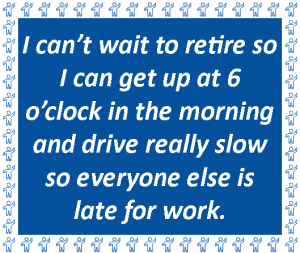 September 2018
September 2018
Old-age pension dates back 130 years ago to Germany when it was created by Chancellor Otto von Bismarck as a way to trick German citizens. What citizens saw as a benefit actually provided little to no value. Retirement age was set at 65 which was approximately life expectancy. Few were expected to live long enough to benefit from old-age pensions. Work-till-you-drop remained the general policy despite this government benefit.
With retirees now living to 80 and beyond the value of old-age pensions has increased.
An estimated 10,000 Canadians are retiring each day so understanding retirement is of increasing importance.
For most, retirement is not a decision made at a specific age after which one enjoys a life of leisure. Many, perhaps most, remain busy well past Canada’s official retirement age of 63. Some are involved in hobbies they were unable to pursue when younger. Others remain fully employed and some partially employed. Many require an income to maintain their desired standard of living.
Age is not the only criteria for determining retirement. Some are forced to retire earlier because of downsizing, weak economy or health issues. Others find their skills are no longer desired. Many who plan to continue working are unable to do so.
 Only 24 percent of private sector workers have secure indexed pensions, a drop from over 50 percent 40 years ago. Those with and without pensions rely on investments, home equity, inheritances and government programs to maintain themselves through retirement. Canada’s public health care system is one of the more significant benefits to retirees.
Only 24 percent of private sector workers have secure indexed pensions, a drop from over 50 percent 40 years ago. Those with and without pensions rely on investments, home equity, inheritances and government programs to maintain themselves through retirement. Canada’s public health care system is one of the more significant benefits to retirees.
Some believe that people who are able to continue working beyond retirement age should continue to do so. This can be difficult. Most companies choose not to hire people over 50. It gets harder to find employment each year afterward.
Retirement promises a life of enjoyment and leisure. It can also deliver a time of boredom, isolation and financial difficulty.
Only 18 percent of people between the ages of 55 and 64 years old have enough money to survive five years according to a Broadbent Institute study.
The definition of retirement has changed as seniors become more active.
Those who move successfully into retirement do well. Many others become marginalized. Among those who become marginalized, women tend to be most affected. They live longer which means they are more likely to run out of money during retirement. For married couples, a retiring male may mean that women retire at an earlier age than they desire.
Low investment returns combined with a reliance on savings accounts create financial challenges for middle-income earners. They lack the wealth to compensate for lower returns and are less able to benefit from government programs.
All of this means future retirees need to take a different approach to managing retirement than recent generations. Finding ways to supplement one’s income may take on increasing importance. It may mean that more people have to ease into retirement by working fewer days each week. Thus far, easing into retirement in this way has not found traction. This may relate to employer mindsets where offices prefer employees available on a full-time basis. For those seeking more control over their work week, companies such as Uber provide potential for a degree of independence and control although at dramatically reduced salaries and loss of traditional company benefits.
 As the economy changes there may be greater opportunities for casual or less-than-full-time employment. This creates more jobs but lower income. Growing corporate interest in less-than-full-time employment is likely to benefit those who struggle to find work including seniors. It will be more challenging for those who seek a single job that pays a good wage.
As the economy changes there may be greater opportunities for casual or less-than-full-time employment. This creates more jobs but lower income. Growing corporate interest in less-than-full-time employment is likely to benefit those who struggle to find work including seniors. It will be more challenging for those who seek a single job that pays a good wage.
Retirement as we have come to understand it is likely to undergo dramatic changes in the coming years.



